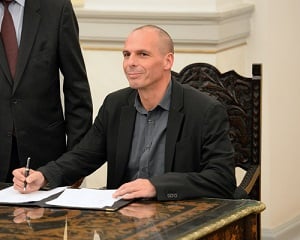 Financial News Today: The Greek debt talks looked promising today (Tuesday) - for a little bit. That was before conflicting reports and a German rebuttal pulled the rug out from under positive momentum.
Financial News Today: The Greek debt talks looked promising today (Tuesday) - for a little bit. That was before conflicting reports and a German rebuttal pulled the rug out from under positive momentum.
You see, Athens is running out of cash to pay its debts. And the liquidity window that the European Central Bank has extended to Greece is set to close in a couple weeks. Greece ultimately wants a debt restructuring deal. But it doesn't want the attached austerity conditions.
Greece's new finance minister Yanis Varoufakis - a product of the far-left, anti-European Union Syriza party's parliamentary election victory last month - has become the spokesman for Greek demands. He wants a 10 billion euro ($11.3 billion) deal. At least to hold Greece over for the next six months as more meaningful debt negotiations take place.
As talks ahead of tomorrow's crucial Eurogroup summit took place behind the scenes, reports looked good. Greece looked like it was going to get that 10 billion euro bridge loan. And what's more - it wasn't going to have to stomach the full blow of the very austerity that they've blamed for the worsening economic situation.
Markets liked what they heard. The Dow Jones today opened up 7 points. The Athens Stock Exchange Index soared 8%.
But as the day wore on the reports became more grim...
Unnamed EU sources said the reports of a Greek debt deal were misleading, according to MNI.
One European official said, "There is no plan." And much more discouraging, he added "the Greeks are digging their own graves."
And later, the ever-unmoving German finance minister Wolfgang Schäuble chimed in. He reportedly said there was no chance of such a deal.
So, what's actually going on in the Eurozone right now?
It's confusing, but it's important to understand who's really "digging their own graves."
Greek Debt Talks Are Ignoring Bigger Problems
Athens is obviously trying to spin a positive narrative out of this. The Syriza party, while not popular in the EU, is getting a lot of support from the Greek public. They are the ones who propelled the party to power as disillusionment with the EU grew amid a worsening employment picture.
And phone calls between Greek Prime Minister and Syriza poster child Alexis Tsipras and EU commission president Jean-Claude Juncker revealed that maybe a debt deal was on the table despite German protests.
But this isn't just about Greece. The discussion right now centers on the piddling 10 billion euro program. That's about 3% of Greece's most recently reported debt figures. Its one-tenth of 1% of the GDP of the Eurozone.
Germany, as the largest economy, has the most leverage in these talks. It will be forced to foot most of the bill and will take the biggest hits from any Greek debt write-downs. The Eurozone and the ECB hold about 80% of Greece's debts.
Greece, Germany contends, should be forced to foot the full bill for its recovery. After all, Germany had to tighten its belt earlier in the decade when its economy hit snags. Germany prides itself on its industry and fiscal discipline.
It's ignoring the fact that it was Germany, not Greece, that got itself in trouble during the dot-com bust. It was Germany's need for monetary stimulus in the early 2000s that sparked an ECB rate cut.
And Germany was able to reap the benefits of a robust export economy on the backs of Greece. When Greece was able to take advantage of German-inspired ECB rate cuts, it imported from Germany - and built Greece's debt up to unsustainable levels.
As economist Richard Koo notes in his book, The Escape from Balance Sheet Recession and the QE Trap, as the euro crisis was building, "German and French banks were by far the biggest lenders to the periphery nations."
Germany, which was hampered by a post-dot-com bust economy, wanted to run surpluses and instead of private investors buying government bonds, they went abroad.
"One of the first places they turned was the European periphery, where housing bubbles had fueled strong economic growth," Koo wrote. "Not only did these markets offer ample loan demand and high interest rates, but there was no currency risk for the lenders because these countries were also in the Eurozone."
From that angle, Germany is the subprime lender of the Eurozone sovereign debt crisis. Now it wants to blame Greek for largesse and reckless spending.
Germany can't stay stubborn forever. Throughout the duration of the Eurozone financial crisis, Germany and the EU could at least fall back on its member countries' electorates voting to power pro-EU powers. Syriza's rise changes that. And the so-called "Euroskeptics" doubled their representation last year in European parliamentary elections.
Now, Greece can't just be forgiven for its fiscal profligacy. It does need to reform a culture of political corruption and cronyism. And the Eurozone itself is in dire need of structural changes.
"Pro-business changes need to be made, such as a fundamental, structural reform of high benefits and hurdles to staff reductions when the economy stagnates," said Money Morning Global Resource Specialist Peter Krauth.
But the Eurozone can't even begin to reform itself without coming to the table on a plan for Greece.
More in European Financial News: A Swiss bank leak yesterday revealed secret accounts and details of more than 100,000 clients from more than 200 countries around the world of the country's financial standard bearer. Account holders include arms dealers, criminal blood diamond merchants, drug cartels, Hollywood elite, royalty, and "the heirs to some of Europe's biggest fortunes." Can you guess which bank it was?


